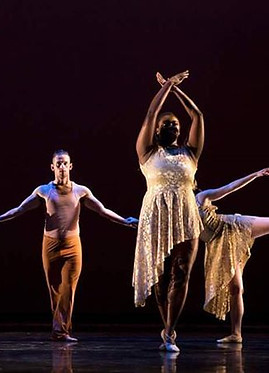Research

Black Women in Dance
I analyze the ways in which Black women have historically and contemporarily navigated dance in the United States.

Dance in Higher Education
I query the ways dance exists in higher education and how space can be made within for Black women.

Racial Battle Fatigue
I deploy critical race theory as a tool of inquiry in the arts and the fatigue that Black people experience from navigating White spaces.
Research Statement
As a young, fat, Black woman Ph.D. in dance studies, my research developed from my desire to understand myself, the systems I exist within, and my future possibilities. As I looked for a way to merge my dance and higher education interests, I knew I wanted to produce new knowledge that would benefit others like me. I draw from theoretical and embodied scholarship that supports an antiracist, Black Feminist, Critical Race Theory, Critical Race Feminism, Intersectionality, and Interdisciplinary lens. Creating scholarship focused on self-preservation is thus a revolutionary act as I navigate territories intended to invalidate my mind, body, and spirit in favor of Whiteness. Through an intentional, consistent, and intersectional framework, I position myself as an advocate for Black women in dance and beyond. I frequently use methods and methodologies that center on my positionality and those of other Black women, including Endarkened Narrative Inquiry, Sister Circles, Autoethnography, Choreographic Analysis, and Dramaturgy.
My research works to validate and celebrate Black women as they survive and resist systems created to marginalize, exploit, disenfranchise, silence, and omit them. I deploy my scholarship as activism, a weapon I wield against the constant mechanisms of injustice. I desire to produce radical research unapologetically void of academic respectability politics that reinforce the White supremacist patriarchy that dominates U.S. culture. My work attempts to unveil how racism, sexism, fatphobia, and other forms of systemic oppression have impacted my body and those of other Black women to reimagine and reengineer societal structures to be more inclusive and just. I root myself in the Black feminist principle of praxis in which the theories of the mind and embodied actions are indistinguishable, consistently informing one another.
Dissertation
Racial Battle Fatigue: Black Women Dance Educators at Predominately White Institutions investigates and affirms how Black women dance educators have navigated the physical, mental, emotional, and behavioral stressors of Predominantly White Institutions. This dissertation is the first critical study of Racial Battle Fatigue within Dance Studies; throughout, I argue that Black women within dance departments at PWIs not only experience Racial Battle Fatigue, like their peers in other departments but also have a specific relationship to it due to their attention and emphasis on embodiment. Black women dance educators occupy a particularly complex intertextual identity regarding race and gender in a generally White feminized subfield of a historically othered and under-resourced field. Furthermore, most university teaching positions in dance require a terminal degree, and within the US, all of these terminal degree programs are in PWIs. I delineate Black women dance educators to include graduate teaching associates, ladder-rank faculty, and non-tenure-eligible adjuncts/instructors who have taught or are currently teaching in PWIs.
The interdisciplinary research design centers on the experiences of Black women dance educators in PWIs; I used an online survey with 73 responses, ten individual interviews utilizing endarkened narrative inquiry, and two sister circles with 11 participants utilizing sister circle methodology to collect primary data for this project. Qualitative and quantitative research approaches deliver a composite analysis of Black women dance educators. Critical analysis of Black women’s navigations through academic dance will expand upon current research in Education Studies, Dance Studies, Performance Studies, Critical Race Studies, and Critical Gender Studies by highlighting the corporeal manifestations and career decisions of those with a heightened understanding of the body.
This dissertation contributes to ongoing theorizations about the intersections of dance studies, race, and higher education. This dissertation identifies institutional and cultural barriers that produce Racial Battle Fatigue in Black women dance educators and outlines coping mechanisms for current and future educators. Supporting and fully embracing Black women in the academy is an integral part of ensuring the academy not only survives but thrives by having access to all of the specialized knowledge that Black women produce.
Research Projects

Presentations
(abbreviated list)
Thick Like Me:The Dawn of Body Liberation
2025
Critical Race and Ethnic Studies Approaches to Popular Dance in Research and Pedagogy
2022
Communities of Embodied Connection: Tracing Community-Building Practices from the Classroom to local and International Movement Exchanges
2022
Publicity
"The Dancer's Guide to Creating Change in Your College Dance Department" by Cadence Neenan
Dance Spirit
Jan 08, 2021
"Social Media Initiative Celebrates Black Lives In The OSU Dance Community"
by Mikey Taylor
The Lantern,
The Ohio State University
Sept 21, 2020